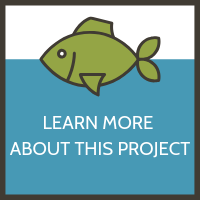
By Alaina Dismukes
The Feed the Future Innovation Lab for Fish Improving Biosecurity team’s main goal is to reduce incidences of diseases in aquaculture by teaching fish farmers better aquaculture practices and connecting them to veterinarians in their area. That is why the stakeholder engagement workshop, held in Ibadan, Nigeria, covering best management practices in aquaculture was a top priority for the team. This final dissemination event served to transfer the Improving Biosecurity team’s knowledge and tools to the local people, so they can put the information gathered into practice moving forward.
The 106 participants gathered in May 2023 and included individuals from across the aquaculture valuechain such as those from government ministries, departments and agencies, fish farmers, veterinarians, extension experts, and researchers from universities.
“A commitment to collaborate by all stakeholders is integral to the development and implementation of a national aquatic animal health strategy and governance,” said Olanike Adeyemo, the Nigerian principal investigator of the activity. “Also, an outline of the minimal requirements and process for the development of the strategy has been contextualized by the Fish Innovation Lab activity and was presented with the participants at the workshop.”
The team created e-AquaHealth, a web-based platform designed to bridge the gap between fish farmers and aquatic veterinary professionals to enhance the delivery of quality services and improve the well-being of fish. The app option is currently under development for easy access.
“We established a list of management practices that help with production and disease prevention,” said Larry Hanson, a U.S. principal investigator of the activity. “The use of these practices is a guide that needs to be customized for each facility. Some important biosecurity measures may be too expensive to implement in some facilities, but allowing more space in aquaculture ponds by not overfilling them with fish helps a lot and is a simple practice to implement.”
The two-day workshop also taught participants about the latest trends in e-technology deployment in food production and aquaculture development as well as provided advice on funding sources to support aquaculture production in the country.
“The workshop was an excellent development,” said Ayo Ajikobi, a Nigerian animal health technician. “I have learned a lot about marketing, how to seek funding, and using the best management practices to ensure quality control and prevent investment loss as well as the importance and need for collaboration.”
Several participants echoed Ajikobi about how the workshop impacted them, but Alhaji Olawepo, a Nigerian fish farmer, emphasized the need for sustainability in aquaculture.
“For aquaculture to be sustainable in this part of the world, people need to be taught what should be done and what shouldn’t be done,” Olawepo said. “We didn't have this knowledge, and now, we do.”
See photos from the workshop down below, and also check out the team's overview video here to learn more about their work.





Published June 15, 2023

